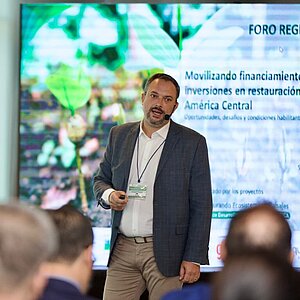Mobilizing private sector investments for FLR in Latin America

How an IKI project supports the development of viable and scalable investments and tools to monitor the impacts of FLR.
Many Latin American countries have pledged ambitious restoration targets in the context of the Bonn Challenge and the 20*20 initiative. These targets and the upscaling of Forest Landscape Restoration (FLR) plays a key role for achieving the mitigation and adaptation contributions in their Nationally Determined Contributions (NDCs), the biodiversity targets of National Biodiversity Strategies and Action Plans, and also for a green recovery after the COVID19 pandemic.
The Bonn Challenge and related initiatives have resulted in unprecedented political attention and many promising restoration pilots. However, achieving FLR-related area targets requires mobilizing billions of USD in up-front investments. Public funding remains limited but has an important catalytical role in this context.
Against this background, UNIQUE forestry and land use GmbH and Finance in Motion GmbH (FiM) jointly implement the project ‘Upscaling of private FLR investments in Latin America (FLILA)’ in Paraguay, Peru and El Salvador, funded by International Climate Initiative (IKI). The main objective of the project is to support the three countries in achieving their FLR targets by addressing bottlenecks for involving the private sector and catalyzing FLR investments. This involves supporting the development of viable and bankable projects for impact investors, working with banks and financial intermediaries on monitoring the impact of FLR-linked projects in their portfolios and providing technical assistance and capacity development to support the upscaling of restoration activities.
A cornerstone is the development of an IT-based Impact Monitoring Tool for financial institutions simplifying cumbersome data collection and subsequent analysis. This represents a key bottleneck and is vital for the development of green credit lines and lending products.
Together with Banco Formento Agropecuario (BFA) from El Salvador, the FLILA project team is building an automatized FLR impact reporting system based on select FLR impact indicators and incorporate the financial sectors’ capacities in terms of monitoring and reporting. Indicators cover three impact areas: conservation/restoration, production/economic and sustainable livelihoods/well-being. Analysis of satellite images as well as the recycling of already existing data is fundamental to derive SMART (apecific, measurable, achievable, reasonable, time-bound) indicators and promote reliable “green” investments. Based on the experience with BFA an open-access tool will be developed accessible for further financial institutions working in the area of FLR investments.
The link has been copied to the clipboard
Contact
IKI Office
Zukunft – Umwelt – Gesellschaft (ZUG) gGmbH
Stresemannstraße 69-71
10963 Berlin
IKI Brown Bag Lunch
A virtual IKI Brown Bag Lunch on the topic took place on 22 April 2021. The presentations are available for download here.








![[Translate to English:] Setzlinge](/legacy/_processed_/8/e/csm_20210906_Nursery_2_hermanos_Paraguay_BMU_Andrea_Braun_UNIQUE_c3e2a3679c.jpg)
![[Translate to English:]](/legacy/_processed_/5/5/csm_Indien_EE_Solar_Frau_bfcf99c425.jpg)